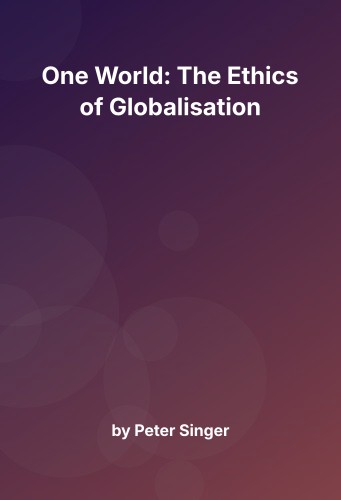One World: The Ethics of Globalisation - A Professional Synopsis
Introduction: Navigating the Global Landscape
In “One World: The Ethics of Globalisation,” Peter Singer delves into the ethical dimensions of globalization, an increasingly pertinent topic in today’s interconnected world. This book challenges professionals to consider the broader implications of their actions and decisions within a global context. Singer’s insights provide a framework for ethical decision-making that is crucial for leaders and organizations aiming to thrive in a rapidly changing environment.
The Ethical Imperative of Globalisation
Understanding Global Interdependence
Singer begins by highlighting the interconnected nature of modern economies and societies. Globalization is not merely an economic phenomenon but a complex web of relationships that affect every aspect of life. Professionals must recognize that their decisions can have far-reaching consequences, impacting people and environments across the globe. This understanding forms the basis for ethical responsibility, urging leaders to consider the global impact of their local actions. For example, when a multinational corporation decides to outsource production to another country, it must consider not only the cost savings but also the effects on local labor markets and environmental standards.
The Moral Responsibility of Corporations
Corporations are powerful players in the global arena, and with power comes responsibility. Singer argues that businesses must go beyond profit maximization to embrace a broader ethical mandate. This involves considering the social and environmental implications of business operations. By integrating ethical considerations into strategic planning, companies can contribute positively to global challenges such as poverty, inequality, and climate change. For instance, a company that invests in sustainable energy not only reduces its carbon footprint but also sets a precedent for industry standards.
Strategic Frameworks for Ethical Leadership
Embracing Ethical Decision-Making Models
Singer introduces several models for ethical decision-making that can guide professionals in navigating complex global issues. One such model emphasizes the importance of stakeholder engagement, urging leaders to consider the perspectives and needs of diverse groups affected by their decisions. This approach aligns with modern business strategies that prioritize corporate social responsibility (CSR) and sustainability. In comparison, books like “The Triple Bottom Line” by John Elkington also explore the integration of social and environmental concerns into business strategies, proposing a framework where companies measure success not only by profit but also by their impact on people and the planet.
Balancing Profit and Purpose
The tension between profit and purpose is a recurring theme in Singer’s work. He advocates for a balanced approach where businesses pursue financial success while also contributing to the common good. By aligning business goals with ethical principles, companies can create sustainable value and foster long-term success. This concept resonates with contemporary movements towards social entrepreneurship and impact investing, as discussed in “Conscious Capitalism” by John Mackey and Raj Sisodia, which emphasizes businesses that serve all stakeholders, including employees, customers, and the environment.
Transformative Insights for the Digital Age
Leveraging Technology for Ethical Outcomes
In the digital age, technology plays a pivotal role in shaping globalization. Singer explores how technological advancements can be harnessed to address global challenges. For instance, digital platforms can facilitate transparency and accountability, enabling consumers to make informed choices and hold companies accountable for their actions. Professionals must leverage technology to promote ethical practices and drive positive change. An example is the use of blockchain in supply chains, which can ensure fair labor practices and traceability of materials.
Agility and Adaptability in a Globalized World
The rapid pace of globalization demands agility and adaptability from organizations. Singer emphasizes the importance of cultivating a flexible mindset and embracing change as an opportunity for growth. This approach is essential for navigating the complexities of the global market and staying competitive in an ever-evolving landscape. By fostering a culture of innovation and continuous improvement, businesses can respond effectively to emerging trends and challenges. Consider the success of companies like Netflix, which continuously adapts its service offerings to cater to diverse international markets.
Ethical Leadership in Practice
Case Studies and Real-World Applications
Singer provides numerous case studies that illustrate the practical application of ethical principles in a global context. These examples demonstrate how organizations can successfully integrate ethics into their business models, achieving both financial success and positive social impact. By learning from these real-world scenarios, professionals can develop strategies that align with their values and contribute to a more equitable and sustainable world. For instance, the transition of Unilever towards sustainable sourcing practices serves as a model for balancing profitability with environmental stewardship.
Building a Culture of Integrity
Creating an ethical organizational culture is essential for sustaining ethical practices. Singer highlights the role of leadership in setting the tone for ethical behavior and fostering an environment of trust and accountability. By prioritizing integrity and transparency, leaders can inspire their teams to act ethically and make decisions that reflect the organization’s values. This is akin to the principles outlined in “Leadership and Self-Deception” by The Arbinger Institute, which emphasizes self-awareness and integrity as cornerstones of effective leadership.
Final Reflection: The Path Forward
“One World: The Ethics of Globalisation” offers a compelling vision for ethical leadership in a globalized world. Singer’s insights challenge professionals to think beyond traditional boundaries and embrace a holistic approach to decision-making. By integrating ethical considerations into their strategies, leaders can drive meaningful change and contribute to a more just and sustainable future. As globalization continues to shape our world, the principles outlined in this book provide a valuable guide for navigating the complexities of the modern business landscape. The synthesis of these ideas is not limited to corporate environments; it extends across domains such as leadership, design, and change management, where ethical considerations are increasingly crucial. By adopting these frameworks, leaders in various fields can foster environments that prioritize ethical outcomes, ensuring long-term viability and success.

